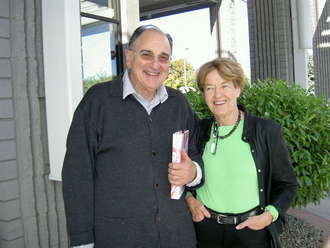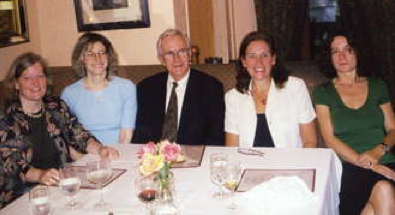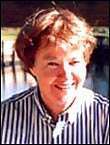
I grew up in Rutland, Vermont, and graduated from Rutland High School. After earning a bachelor's degree in government at Smith College, I went on to get a master's degree and, later, was presented with an honorary doctorate from Goucher College. In between I did a lot of teaching. Then I became a newspaperwoman: I was a reporter for The Ledger-Star in Norfolk, Virginia; a business writer and editorial writer for the The Virginian-Pilot; as well as a freelancer for a number of publications including the The Wall Street Journal. I was also assistant editor of McGraw-Hill's World News in New York City. I have never stopped being a student. I've taken courses at Johns Hopkins, Harvard, Bennington, Cornell, and the Wharton School of Business. I've been a teacher: in Syracuse, New York; Omaha, Nebraska; and Virginia Beach, Virginia. And I've taught in elementary school, middle school, high school, and in a community college. I taught a writing course to high school English teachers (who got U of Va credit for it). I had fun, the teachers may have worked harder than they expected. While my husband and I spent many years in Colorado and Virginia, we now live in the Washington, D.C., area. We have five grandchildren.
Currently, I am writing a storyteller's book on biology, which includes new research into evolutionary biology and presents the three domains that currently describe the biological world. It's an amazing subject, perhaps the defining science of our time. I'm having fun. Right now a natural process known as CRISPR is changing life science. Read about it. It's the future. This is the Information Age. To productively handle information you need to research (read), process (think), and use (write). So reading, writing and critical thinking are today’s essential skills. Writing is a process that helps readers make sense of their reading. You can't write without doing some thinking. As for science history? Mostly we don't teach it. Why not? In this, the greatest age of science ever, it is essential. It's also interesting, timely and mind-stretching. Cultures have traditionally passed on their ideas through stories. The Greeks knew that, and so, too, did Mr. McGuffey, whose story-filled "readers" taught generations of Americans to think. I certainly didn't create the books all by myself. Byron Hollinshead produced A History of US and The Story of Science, besides providing guidance and support. This picture shows the amazing team that made The Story of Science possible: Lorraine "Lorri" Egan, editor; Kate Davis, copy editor; Byron H.; Marleen Adlerblum, designer; and Sabine Russ, managing editor. Byron's amazing skills as a publisher and his elegant taste, helped make the books what they are. We all believe that publishers should be producing the best books possible for young readers. They know the difference.
Tamara Glenny, not pictured here, was the incredible editor of A History of US. You can read about her at the end of Liberty for All (Book Five). |
READING SCORES HAVE RISEN DRAMATICALLY IN SOME CLASSES USING A HISTORY OF US TO TEACH READING.
While reading scores in this country have been in a downward trajectory, IQ scores have been going up. In other words, as our students have been getting smarter their reading skills have been declining. That shouldn't be happening. One of our leading educators, E.D. Hirsch, Jr, blames the "ephemeral fiction" used in most reading instruction. In "The Knowledge Deficit," Hirsch writes, "The association of language arts mainly with fiction and poetry is an accident of recent intellectual history." We once taught reading with "narratives about the real world of nature and history." Here is the Voice of America visiting a classroom using A History of US. Click here. *Recognition* In 1995, Pulitzer-prize winning historian David McCullough went before the Senate Education Committee in support of a bill sponsored by Lamar Alexander and Ted Kennedy intended to improve the teaching and learning of history. McCullough gave a scathing attack on the state of textbooks, but cited Hakim's book as an exception: "Joy Hakim's new... multi-volume History of the United States is superb. But others are dismal almost beyond describing." Joy and her books have garnered numerous awards and accolades. She was honored with the Smith College Medal: awarded for achievements as author of innovative textbooks. Her series A History of Us has been awarded: • 2012 McGuffey Award in Humanities and Social Sciences by the Text and Academic Author’s Association • 2012 Ron Pynn Award for National Distinction in Educational Publication from the Text and Academic Authors Association (TAA) • 2003 Matrix Foundation: Edith Workman Award • 2001 The NY State Council for Social Studies: Salute to Joy Hakim • 1997 the first James A. Michener Award for Writing by the National Council for Social Studies and two Parents' Choice awards. The Story of Science was: • 2008 Winner of Benjamin Franklin Award for Education/Teaching/Academic This award is sponsored by The Independent Book Publishers Association. • 2008 Awarded Selector's Choice 2008 CBC/NSTA's Outstanding Science Trade Books for Students K-12 • 2008 Selected as a nonfiction finalist in the 2008 Colorado Book Awards • The Nation’ s Best Books 2007 Award Winner, Science General went to The Story of Science: Einstein Adds A New Dimension. This award is sponsored by USA Book News and is given to the best science book of the year. Now in revised third and fourth editions, incorporating new materials and corrections, books from A History of Us have been recommended to accompany the Common Core curriculum. The books are also used in some home school curricula. |
|
Instagram: @storiesforthinkers
|
Facebook: @Joy Hakim
|
|
Twitter: @jhakim_edugeek
|
Email: joyhakimbooks@yahoo.com
|


